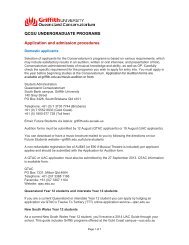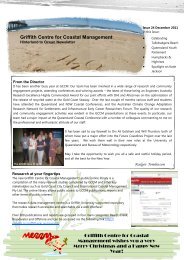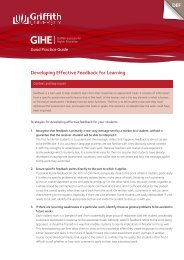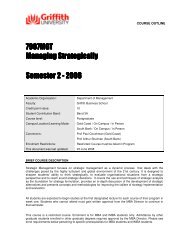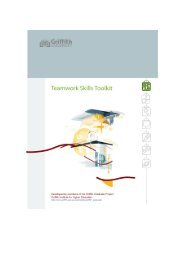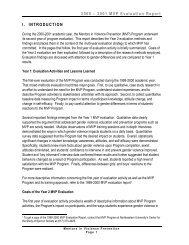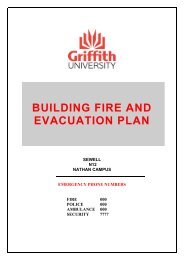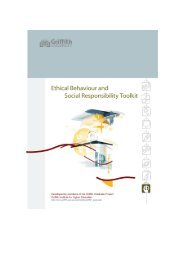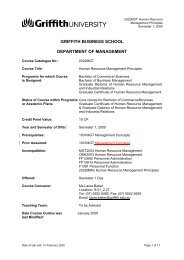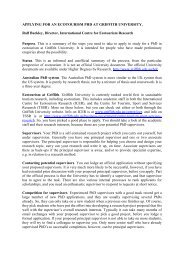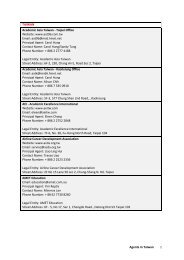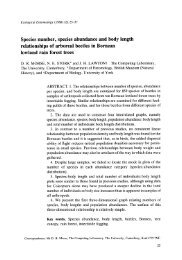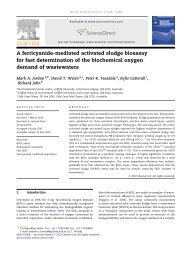Expectations for learning don't add up - Griffith University
Expectations for learning don't add up - Griffith University
Expectations for learning don't add up - Griffith University
Create successful ePaper yourself
Turn your PDF publications into a flip-book with our unique Google optimized e-Paper software.
Winter 2008 PAGE 7<br />
Sustaining older workers’ competence<br />
A <strong>Griffith</strong> <strong>University</strong> research project will identify<br />
practices <strong>for</strong> workplaces and educational institutions<br />
to sustain and develop the skills of Australia’s growing<br />
number of older workers. <strong>Griffith</strong> Institute <strong>for</strong> Educational<br />
Research member and program leader, Professor<br />
Stephen Billett says maintaining the effective working life<br />
of older Australian workers is essential <strong>for</strong> sustaining the<br />
economic and social health of the nation. “It’s important<br />
<strong>for</strong> older people’s sense of workplace efficacy and sense<br />
of self as productive members of the community,’’ he<br />
said.<br />
In most advanced industrial economies, if you are<br />
working and over 45 years of age, you are classified<br />
as an ‘older worker’. Yet, <strong>for</strong> many older workers,<br />
this categorisation brings a range of ambiguities and<br />
contradictions.<br />
In countries like Australia, the realisation of key social<br />
and economic goals is becoming increasingly dependent<br />
<strong>up</strong>on an older work<strong>for</strong>ce. This is because older workers<br />
comprise a growing percentage of the nation’s work<strong>for</strong>ce.<br />
There is a decline in the number of workers entering the<br />
work<strong>for</strong>ce, and people are electing or will have to work<br />
longer. The reality is that to sustain the quality and extent<br />
of the nation’s goods and services, the competence<br />
of these older workers will need to be maintained and<br />
sustained, <strong>for</strong> longer. Like other categories of workers,<br />
these workers also need to maintain that competence<br />
in face of constant changes to work and ways of<br />
working. Yet, in the provision of opportunities <strong>for</strong> further<br />
development and advancement employers tend to<br />
overlook older workers. The preference is <strong>for</strong> s<strong>up</strong>porting<br />
and promoting younger and well-qualified workers.<br />
This preference may well continue as younger workers<br />
increasingly become a scarce commodity.<br />
Working with colleagues from the <strong>University</strong> of Stirling,<br />
this International Linkage project seeks to identify ways<br />
to sustain older workers’ occ<strong>up</strong>ational competence<br />
through a program of collaborative research in Australia<br />
and Britain. Both countries have unresolved concerns<br />
about maintaining the effectiveness of older workers<br />
and developing their capacities to manage their<br />
transitions to new work, ways of working and current<br />
work requirements. The project aims to: (i) in<strong>for</strong>m<br />
policy and practice <strong>for</strong> both countries’ workplaces<br />
and education institutions to effectively maintain older<br />
workers’ capacities and managing work transitions; (ii)<br />
identify appropriate <strong>learning</strong> strategies and curriculum<br />
practices <strong>for</strong> these purposes in both workplaces and<br />
educational institutions; (iii) identify, evaluate and share<br />
instances of good practice in workplaces and educational<br />
programmes; and (iv) develop effective institutional<br />
responses to this shared problem. To realise these aims,<br />
older workers’ competence in each country, two industry<br />
sectors will be investigated in Australia compatible with<br />
the British counterpart program. Within each industry<br />
sector, there will be 30 interviews and five focus gro<strong>up</strong>s<br />
with older workers to identify key factors shaping the<br />
prospects <strong>for</strong> older workers’ continuing workplace<br />
competence. These factors will be elaborated through<br />
<strong>up</strong> to six case studies. Then, a survey will be undertaken<br />
across a wider cohort of older workers to verify the<br />
plausibility of what has been identified in these earlier<br />
activities.



